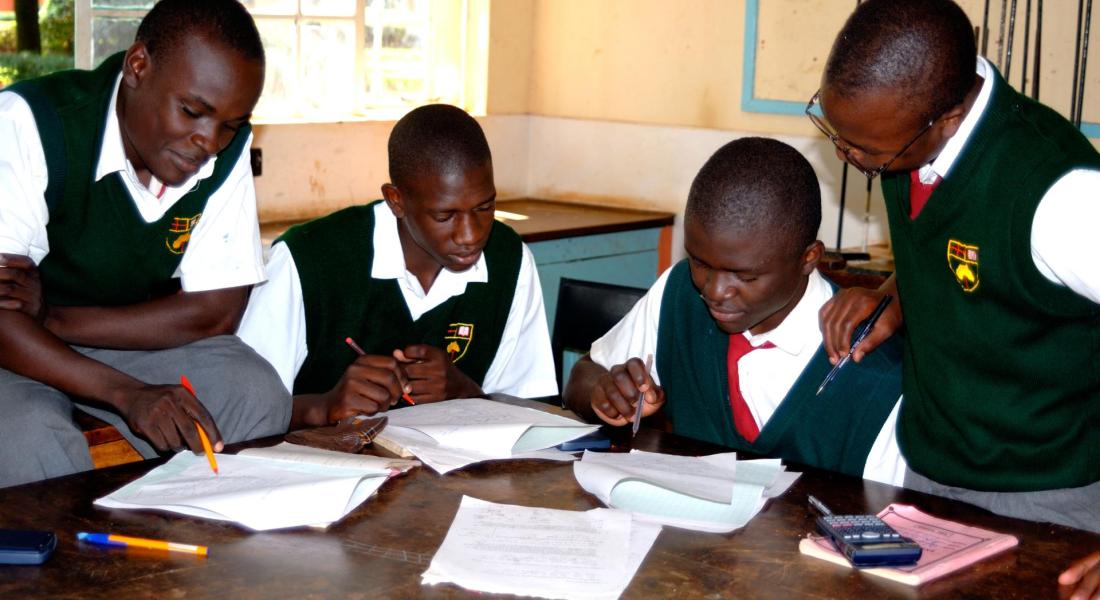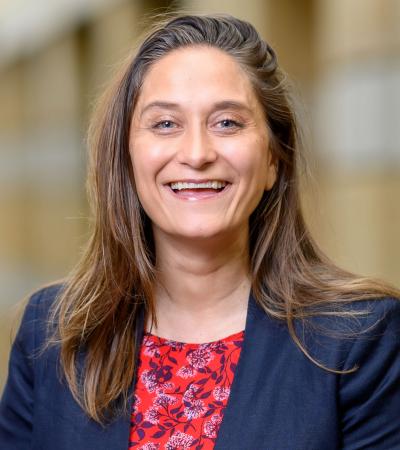Education & Citizenship Kenya
Education and Citizenship in Kenya

Click here to read an article about this study as its findings are being published.
Rationale for the Study
Education is thought to contribute to citizenship formation by inculcating a sense of nationalism, but also by spurring citizen engagement through the diffusion of political knowledge, the contribution to internal efficacy, and the encouragement of political participation. In an ideal world, education can build trust towards fellow citizens. However, schools vary in their capacity and commitment to shape these various dimensions of citizenship. The type of school (government, religious, or for-profit) could shape the values espoused through the curriculum as well as students’ and their families’ perceptions of the government. Relatedly, the level of diversity within the student body could also affect students’ citizenship formation, by affecting students’ tolerance and trust in positive or negative ways.
This study will examine how secondary schooling experiences shape three dimensions of citizenship in Kenya - political knowledge, political engagement, and trust towards other citizens. Since its transition to multi-party rule in 1992, most elections have been plagued by violence, population displacement, and heightened ethnic tension. However, Kenya holds many exciting opportunities for youth – it is considered the primary economic and innovation leader in East Africa and boasts a vibrant civil society.
In this environment, questions of citizenship formation are extremely important yet remain understudied. Some studies have explored the effect of development interventions like de-worming on increasing school attendance (Kremer et Miguel 2004) and others have looked at the impact of specific civics curriculum on heightened democratic norms and knowledge (Finkel and Smith 2011; Finkel, Horowitz, Rojo-Mendoza 2012). However, studies have not yet explored students’ broader schooling experience and its relation to citizenship.
It is unclear that schooling will increase knowledge, participation and generalized trust in Kenya. Literature on education and citizenship formation in Africa has shown a complicated relationship between schooling and citizenship. Unlike the American context, where higher levels of education are associated with greater participation, studies from sub Saharan Africa show more mixed evidence. In some systems, the most educated students are not always the most engaged – in part due to skepticism about the political system.(1)
While studies in the American context, have identified some variables, such as school type (Campbell 2006, Dee 2003, Fleming et al 2014), classroom diversity (Campbell 2007, Dinesen 2011, Juvonen 2006), and classroom environment (Campbell 2008) that affect political engagement - there is no comparable evidence from sub Saharan Africa.(2)
Research Question
This proposal seeks to evaluate the effect of schooling experiences on citizenship formation in Kenya. How do secondary schooling experiences shape citizenship orientation in Kenya? In our examination of citizenship, we are concerned with political knowledge and political engagement, as well as trust fellow citizens – particularly non-co-ethnics. We focus on two primary explanatory variables that have been found to be salient in other contexts: a) the type of school that citizens attend (government or Church-founded) and b) the level of diversity in a school population.
In addition, our study will explore how various elements of the schooling experience including students’ perception of school climate, their acquisition of soft skills, and their exposure to different types of extracurricular activities and non-exam related curriculum shape knowledge, engagement, trust/tolerance, and values.
Research Design
Existing research on education and citizenship in Africa is plagued by two major problems. First, most studies do not probe deeply into students’ experience and school characteristics to understand what factors are associated with greater knowledge, engagement, and trust. They merely compare outcomes across citizens with different educational backgrounds. Second, many studies are plagued with selection issues as parents’ attitudes may shape enrollment decisions and students’ citizenship choices.
We compare 4,360 Form 4 students across 108 schools (19 national, 40 new national, 40 “matched” county schools and 10 private religious schools). We leverage Kenya’s recent devolution policy and student placement procedures, which are largely exogenous to parent or school preferences, to compare schooling experiences across schools with different characteristics. At the end of primary school, students take a placement exam and those students who score over 400 (of 500) are eligible for placement in one of 105 “national schools.” The Ministry of Education assigns students to schools using a combination of student scores, student preference, and consideration for geographic diversity quota for each school. (3) In practice this means that student body composition is largely governed by factors other than students’ and parent’s selection into specific schools.(4) This placement system allows us to compare across different types of national schools, which vary in terms of whether they are government-founded or religiously affiliated (Catholic, Anglican, Non-denominational).(5) This placement procedure gives us sufficient confidence that parental decisions are not the primary factor driving both student assignment to a religious or government school and the outcome variables of interest.
In 2010, Kenya expanded the number of national schools up from 19(6) original schools to 105; in doing so, many former provincial schools were converted into national schools. As provincial schools became “national schools,” the government gained control over placement and implemented a diversity quota that is mandated for all national schools. The creation of new national schools meant that these schools were now required to recruit students from other regions of the country. It also allows us to compared new national schools to a pool of “matched” county schools that have many of the same characteristics as the national schools (student bodies with the same mean entrance exams, boarding facilities, adequate material resources). To be eligible, schools needed the capacity to educate six “streams” or 6 cohorts of 40 students each.
Therefore, we anticipate that there are many other “like” schools that did not become national and, thus, do not have the diversity quota. We will select a random sample of 40 new national schools and then use a matched pair design to compare each national school to one of five high- performing county schools (n=40).
To generate sufficient variation in school type, we will also include a sample (n=10) of private religious schools. (7) We will select schools with an average entrance exam score comparable to our sample of national schools. We include them to understand the full range of citizenship experiences – particularly as these schools may employ a more rigorous religious curriculum than the Church-founded national schools. If, for instance, schools emphasize Christian social teaching, we may observe greater trust and tolerance of fellow citizens.
Conversely, Christian education may build greater in-group allegiance at the expense of generalized trust.
Our study will focus on students completing their final year in national schools, “new national” schools, “matched” extra county schools, and private-religious schools. By limiting our study to the highest performing students and schools, we sacrifice the ability to generalize about the impact of the educational experience and citizenship formation for Kenyan secondary students. However, by restricting our population of interest to these schools and students, wecan sidestep many other ways that schools might not be comparable including variation in material resources and students’ educational performance. From a policy perspective, this specific population is most likely to become the future leaders of the state. Understanding their orientation towards politics and towards each other is key to forecasting how Kenya’s future.
Data Collection and Analysis
The research design will include a school survey and a survey of Form 4 students. The school survey will help us to understand variation in the schooling experience as offered by the schools in our sample. We will collect data on the school infrastructure, access to resources, teacher background and educational level, curriculum, levels of study body diversity, and extra- curricular activities.
The student survey will contain modules including student perceptions of school climate, student efficacy, and soft-skills, in addition to our main outcomes of interest: levels of political knowledge, political engagement, tolerance and trust. In addition to self-reported scores, we will include some behavioral observations/games to measure participation and trust. We will also include a group of controls for individual-level confounders that might affect knowledge, engagement, and generalized trust.
Data analysis will compose of three steps. First, we will isolate the data to the new national schools and their matched pairs. This will isolate the exogenous variation in diversity as created by the new policy. We will test for statistical differences between the pairs on the relevant outcome variables. Second, we will repeat the analysis and include relevant covariates which can also explain differences in outcomes, such as differences in resources, urban or rural areas, pedagogy, infrastructure, extracurricular and religious activities. Finally, we will repeat this analysis including the old national schools and religious-run schools to allow for more variation in school type. This can help us understand the effect of being in more established schools with national reputations, or the effect of being in a more deeply religious school. All analysis will use cluster-robust standard errors at the relevant geographical unit. All analysis will be conducted inSTATA®.
The broader research team is composed of collaborators from Kenya and the US. The fieldwork implementation will be led by staff based in Notre Dame’s Nairobi office. Data analysis and writing will be completed in South Bend. We will work in partnership with our co-author from the Catholic University of East Africa in order to facilitate collaboration with the Ministry of Education.
(1) See Croke et al (2015), who found that higher education in Zimbabwe was associated with lower levels of voting, contacting a politician, or attending a community meeting; Bleck (2015) finds that while primary and secondary education are associated with higher participation rates, college educated Malians are no more likely to vote than Malians with no education; Marshall and Larreguy argue that the primary and secondary education is associated with higher voting rates in Nigeria (2017).
(2) One exception is Finkel’s comparative study of South Africa and the Dominican Republic, which shows the effect of civic education varies greatly depending on exposure and teaching methodologies (2002).
(3) Five top candidates from each sub-county automatically get admission to national schools.
(4) Initial interviews that we have conducted in Kenya suggest that students’ and parents’ choice is primarily motivated by the ranking of these schools rather than the consideration of the type of school. Many students typically list top-ranking schools first – meaning that requests into these schools may be 10 times more than the number of available slots; in practice – very few students get their top choice (Interviews in 5 Secondary Schools, January 2018).
(5) Our initial estimates that within the universe of national schools - 17 are Catholic-founded, and additional 27 are other Christian schools (Anglican, Seventh Day Adventist, Quaker, Non- denominational)
(6) One might make an analogy to the US Ivy League as these schools are old, well-branded, and have an extensive alumni network.
(7) These schools are included outside of our matching framework and are plagued by self-selection issues. However, they offer variation in schooling experience in terms of their greater commitment to religious curriculum compared to religious-founded national schools (Interview, Nairobi, December 2017).







